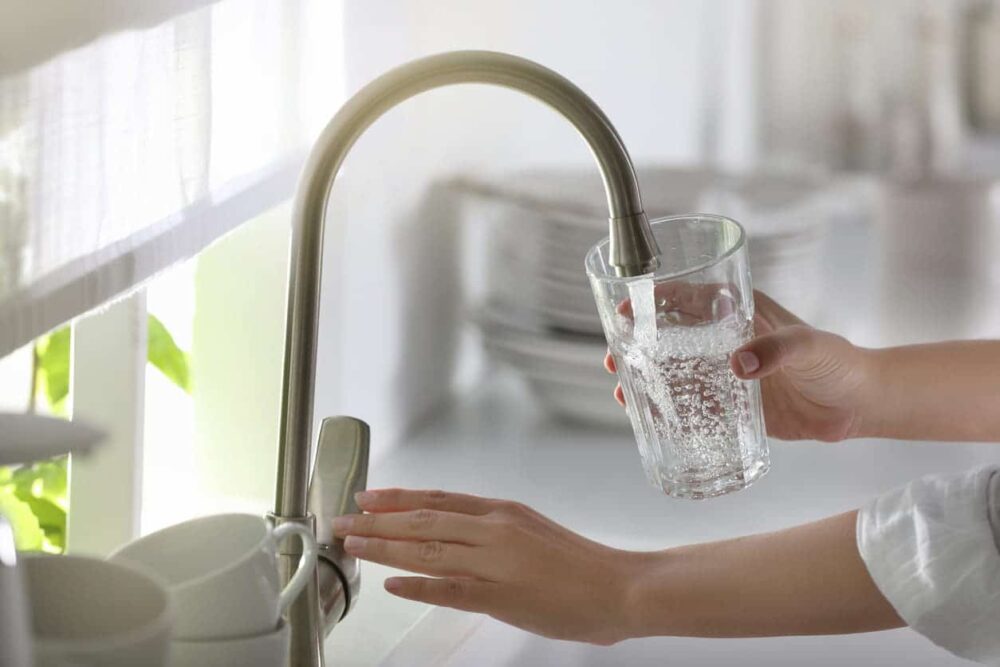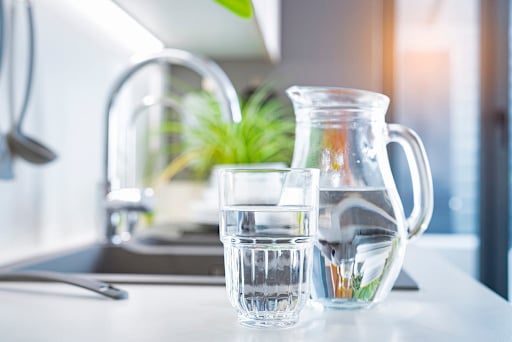
As a team dedicated to improving your water quality, we’re often asked, “Is the tap water in Las Vegas safe to drink?”
The Las Vegas water supply originates from the pristine snowmelt in the Rockies, traveling down through the Colorado River. The city’s tap water is regularly tested and considered safe for consumption.
However, while the water is deemed safe, that doesn’t necessarily mean it’s the best quality for your home or your health. Let’s dive into the details of Las Vegas’ water and how Rain of Las Vegas can help enhance its quality.
Is the water in Las Vegas safe to drink?
Yes, tap water in Las Vegas is considered safe to drink. It meets or exceeds all federal and state health standards, as stated by the Las Vegas Valley Water District. Some standards that are required to be met include maximum lead content, disinfectant levels, and microbial contaminants.
The Las Vegas Valley Water District tests for over 150 different compounds each year and 80 common organic chemicals each month. Plus, 60% of the water is delivered directly from the Colorado River, creating some of the most pristine water in the country.
But to really understand what’s going on with your tap water, it’s important to assess each of the indicators that make up the overall quality of your water.
Las Vegas tap water quality
The following elements affect the quality of your tap water in Las Vegas:
PH
The pH of Las Vegas tap water measures around 7.9, falling within the safe range of 6.5 – 8.5 pH units. This balance helps to ensure the water isn’t too acidic or basic, which could potentially harm your health or plumbing systems.
Contaminants
Contaminants are a concern in most water supplies, and Las Vegas is no exception. Some common contaminants found in tap water include:
- Heavy metals such as arsenic, lead, and copper
- Pesticides
- Fertilizers
- Industrial pollutants from manufacturing plants
- Microorganisms like bacteria and viruses
- Hormone-disrupting chemicals
The journey of the water from the mountains to our faucets in Las Vegas provides ample opportunities for various contaminants to infiltrate it. While the Colorado River’s water is generally clean, it is not immune to potential pollutants that can be introduced at any point before it reaches our homes.
Chlorine
Chlorine is used to disinfect the water supply and kill any harmful microorganisms. However, some people may find the taste and smell of chlorine in their water unpleasant.
Arsenic
Arsenic, a naturally occurring element, can also be found in Las Vegas tap water. While it’s typically present at safe levels, long-term exposure to high levels of arsenic in drinking water can cause various health issues.
Lead
Lead is another element that can be found in Las Vegas tap water. According to the most recent water quality report, lead is present in an average of about 3.9 parts per billion. While this falls within federal safety standards, no level of lead is considered completely safe.
Water hardness
Hard water refers to the amount of dissolved calcium and magnesium in the water. Las Vegas water is known to be quite hard, due to the high mineral content of the Colorado River, which supplies about 90% of the city’s water.
Sipping on hard water — unveiling its impact
While Las Vegas’ tap water is deemed safe to drink, it’s crucial to understand that it is considered hard water. While this isn’t a health risk per se, it can have some effects on the body.
Dry skin and hair
One of the most common issues associated with hard water is its effect on skin and hair. The minerals in hard water can leave a film on the skin, reducing its moisture and potentially leading to dryness and irritation.
Some symptoms of skin and hair exposed to hard water over time can include:
- Redness
- Flaking
- Itching
- Cracking
- Peeling skin
- Brittleness
- Dullness
Hard water also impacts laundry, and this can make your skin and hair feel even more dry.
Who should be cautious about drinking tap water?
While tap water is generally considered safe for consumption, certain groups may need to exercise caution due to possible contamination or the presence of minerals:
- Pregnant individuals: Although there’s no direct evidence linking tap water contaminants to pregnancy complications, it’s always a good idea for those expecting to consume the highest quality water possible
- Infants: Babies have sensitive systems that can be affected by the quality of tap water. If using water to mix baby formula, parents may want to consider using filtered or bottled water instead.
- People with compromised immune systems: Individuals with weakened immune systems should be cautious about their water source. They are more susceptible to potential contaminants in tap water that could pose health risks.
- Those concerned about long-term effects: Some people may be concerned about the potential long-term effects of consuming tap water with high mineral content or possible contaminants. If this is a concern, consider installing a water filtration system.
Remember, if you have any concerns about your tap water, it’s always a good idea to have it tested. This can provide peace of mind and help you make informed decisions over time.
How can I make sure the water in my Las Vegas home is safe to drink?
To make your water safer to drink, consider the following steps:
Install a water filtration system
A water filtration system can help remove impurities and potential contaminants from your tap water, providing you with cleaner, safer water for daily consumption.
This system works in several steps to ensure the water you consume is clean and safe:
- Aeration: This process adds air to the water, allowing gases and other volatile compounds to escape
- Physical filtration: This is essentially straining the water to remove larger impurities. It’s akin to a sieve that filters out larger particles from the water.
- Coagulation: This process suspends solids in the water, making them easier to filter out
- Sediment pre-filter: This is a common first step in whole-house filters, where larger particles are removed before the water goes through additional filtering stages
- Advanced filtration: Depending on the system, there may be additional stages of filtration to target specific contaminants. For example, some systems use activated carbon filters to remove unwanted tastes and odors.
- Final treatment: The now filtered water flows up the center of the system and is ready for use
Use a water softener 
Water softeners can reduce the hardness of your water by removing excess minerals. This not only improves the taste and feel of your water but can also be beneficial for your skin and hair.
A water softener works by using ion exchange, a process that replaces the calcium and magnesium in water with “softer” ions (usually sodium), resulting in softened water.
This can be done easily with a simple countertop system or a more advanced whole-house filter.
Regularly test your tap water
It’s essential to regularly test your tap water for potential contaminants. Many at-home testing kits are available, or you could opt for professional testing services for a more comprehensive analysis.
Consider rainwater harvesting
Rainwater harvesting is an eco-friendly solution to improve your water quality. Rainwater is naturally soft, and when properly collected and filtered, it can provide a reliable source of high-quality water.
You can get started with rainwater harvesting with a simple collection system, such as a barrel or tank. This is an easy and cost-effective way to collect water from your roof without having to purchase large storage tanks.
Stay informed about your local water quality
Keep up-to-date with local water quality reports. These reports can provide valuable information about any potential issues with your local water supply, helping you take proactive measures to ensure your water’s safety.
In order to keep up with Las Vegas’ water quality, you can check the Las Vegas Water District’s website.
Final thoughts
So can you drink the tap water in Las Vegas? Yes! But remember, while the city’s water supply has been approved, there are plenty of additional precautions you can take to make sure your tap water is the best quality possible. Rain Water Conditioning of Las Vegas can help you every step of the way.
Have questions or need expert advice? We’re here to help! Reach out to us today and let’s start a conversation about your water needs.
Disclaimer: Any information this blog provides is for informational purposes only and must not be relied upon as a professional opinion.
Tags: hard water, las vegas, water conditioner, water softener
